『武士道 Bushido 』-新渡戸稲造(Inazo Nitobé)-
Chapter 08
(Honor 「名誉」苦痛と試練に耐えるために)
Bushido, the Soul of Japan by Inazo Nitobe
[Book]
[reading]
・Chapter TOP 新渡戸稲造(Inazo Nitobé)TOP
・Chapter 00(Prefaces 序文)
・Chapter 01(Bushido as an Ethical System 武士道とは)
・Chapter 02(Sources of Bushido 武士道の源)
・Chapter 03(Rectitude or Justice 「義」)
・Chapter 04(Courage, the Spirit of Daring and Bearing 「勇」)
・Chapter 05(Benevolence, the Feeling of Distress 「仁」)
・Chapter 06(Politeness 「礼」)
・Chapter 07(Veracity or Truthfulness 「誠」)
・Chapter 08(Honor 「名誉」)
・Chapter 09(The Duty of Loyalty 「忠義」)
・Chapter 10(Education and Training of a Samurai 武士は何を学びどう己を磨いたか)
・Chapter 11(Self-Control 人に勝ち己に勝つために)
・Chapter 12(The Institutions of Suicide and Redress 「切腹」)
・Chapter 13(The Sword, the Soul of the Samurai 「刀」)
・Chapter 14(The Training and Position of Woman 武士道が求めた女性の理想像)
・Chapter 15(The Influence of Bushido 「大和魂」)
・Chapter 16(Is Bushido Still Alive? 武士道は蘇るか)
・Chapter 17(The Future of Bushido 武士道から何を学ぶか)
・[修養]、
・[自警録]
that it is high time I should pause a few moments for the consideration of this feature of the Precepts of Knighthood.
The sense of honor, implying a vivid consciousness of personal dignity and worth, could not fail to characterize the samurai, born and bred to value the duties and privileges of their profession. Though the word ordinarily given now-a-days as the translation of Honor was not used freely, yet the idea was conveyed by such terms as na (name) men-moku (countenance), guai-bun (outside hearing), reminding us respectively of the biblical use of "name," of the evolution of the term "personality" from the Greek mask, and of "fame." A good name—one's reputation, the immortal part of one's self, what remains being bestial—assumed as a matter of course, any infringement upon its integrity was felt as shame, and the sense of shame (Ren-chi-shin) was one of the earliest to be cherished in juvenile education. "You will be laughed at," "It will disgrace you," "Are you not ashamed?" were the last appeal to correct behavior on the part of a youthful delinquent. Such a recourse to his honor touched the most sensitive spot in the child's heart, as though it had been nursed on honor while it was in its mother's womb; for most truly is honor a prenatal influence, being closely bound up with strong family consciousness. "In losing the solidarity of families," says Balzac, "society has lost the fundamental force which Montesquieu named Honor." Indeed, the sense of shame seems to me to be the earliest indication of the moral consciousness of our race. The first and worst punishment which befell humanity in consequence of tasting "the fruit of that forbidden tree" was, to my mind, not the sorrow of childbirth, nor the thorns and thistles, but the awakening of the sense of shame. Few incidents in history excel in pathos the scene of the first mother plying with heaving breast and tremulous fingers, her crude needle on the few fig leaves which her dejected husband plucked for her. This first fruit of disobedience clings to us with a tenacity that nothing else does. All the sartorial ingenuity of mankind has not yet succeeded in sewing an apron that will efficaciously hide our sense of shame. That samurai was right who refused to compromise his character by a slight humiliation in his youth; "because," he said, "dishonor is like a scar on a tree, which time, instead of effacing, only helps to enlarge."
Mencius had taught centuries before, in almost the identical phrase, what Carlyle has latterly expressed,—namely, that "Shame is the soil of all Virtue, of good manners and good morals."
The fear of disgrace was so great that if our literature lacks such eloquence as Shakespeare puts into the mouth of Norfolk, it nevertheless hung like Damocles' sword over the head of every samurai and often assumed a morbid character. In the name of Honor, deeds were perpetrated which can find no justification in the code of Bushido. At the slightest, nay, imaginary insult, the quick-tempered braggart took offense, resorted to the use of the sword, and many an unnecessary strife was raised and many an innocent life lost. The story of a well-meaning citizen who called the attention of a bushi to a flea jumping on his back, and who was forthwith cut in two, for the simple and questionable reason that inasmuch as fleas are parasites which feed on animals, it was an unpardonable insult to identify a noble warrior with a beast—I say, stories like these are too frivolous to believe. Yet, the circulation of such stories implies three things; (1) that they were invented to overawe common people; (2) that abuses were really made of the samurai's profession of honor; and (3) that a very strong sense of shame was developed among them. It is plainly unfair to take an abnormal case to cast blame upon the Precepts, any more than to judge of the true teaching of Christ from the fruits of religious fanaticism and extravagance—inquisitions and hypocrisy. But, as in religious monomania there is something touchingly noble, as compared with the delirium tremens of a drunkard, so in that extreme sensitiveness of the samurai about their honor do we not recognize the substratum of a genuine virtue?
The morbid excess into which the delicate code of honor was inclined to run was strongly counterbalanced by preaching magnanimity and patience. To take offense at slight provocation was ridiculed as "short-tempered." The popular adage said: "To bear what you think you cannot bear is really to bear." The great Iyéyasu left to posterity a few maxims, among which are the following:—"The life of man is like going a long distance with a heavy load upon the shoulders. Haste not. * * * * Reproach none, but be forever watchful of thine own short-comings. * * * Forbearance is the basis of length of days." He proved in his life what he preached. A literary wit put a characteristic epigram into the mouths of three well-known personages in our history: to Nobunaga he attributed, "I will kill her, if the nightingale sings not in time;" to Hidéyoshi, "I will force her to sing for me;" and to Iyéyasu, "I will wait till she opens her lips."
Patience and long suffering were also highly commended by Mencius. In one place he writes to this effect: "Though you denude yourself and insult me, what is that to me? You cannot defile my soul by your outrage." Elsewhere he teaches that anger at a petty offense is unworthy a superior man, but indignation for a great cause is righteous wrath.
To what height of unmartial and unresisting meekness Bushido could reach in some of its votaries, may be seen in their utterances. Take, for instance, this saying of Ogawa: "When others speak all manner of evil things against thee, return not evil for evil, but rather reflect that thou wast not more faithful in the discharge of thy duties." Take another of Kumazawa:—"When others blame thee, blame them not; when others are angry at thee, return not anger. Joy cometh only as Passion and Desire part." Still another instance I may cite from Saigo, upon whose overhanging brows "shame is ashamed to sit;"—"The Way is the way of Heaven and Earth: Man's place is to follow it: therefore make it the object of thy life to reverence Heaven. Heaven loves me and others with equal love; therefore with the love wherewith thou lovest thyself, love others. Make not Man thy partner but Heaven, and making Heaven thy partner do thy best. Never condemn others; but see to it that thou comest not short of thine own mark." Some of those sayings remind us of Christian expostulations and show us how far in practical morality natural religion can approach the revealed. Not only did these sayings remain as utterances, but they were really embodied in acts.
It must be admitted that very few attained this sublime height of magnanimity, patience and forgiveness. It was a great pity that nothing clear and general was expressed as to what constitutes Honor, only a few enlightened minds being aware that it "from no condition rises," but that it lies in each acting well his part: for nothing was easier than for youths to forget in the heat of action what they had learned in Mencius in their calmer moments. Said this sage, "'Tis in every man's mind to love honor: but little doth he dream that what is truly honorable lies within himself and not anywhere else. The honor which men confer is not good honor. Those whom Châo the Great ennobles, he can make mean again."
For the most part, an insult was quickly resented and repaid by death, as we shall see later, while Honor—too often nothing higher than vain glory or worldly approbation—was prized as the summum bonum of earthly existence. Fame, and not wealth or knowledge, was the goal toward which youths had to strive. Many a lad swore within himself as he crossed the threshold of his paternal home, that he would not recross it until he had made a name in the world: and many an ambitious mother refused to see her sons again unless they could "return home," as the expression is, "caparisoned in brocade." To shun shame or win a name, samurai boys would submit to any privations and undergo severest ordeals of bodily or mental suffering. They knew that honor won in youth grows with age. In the memorable siege of Osaka, a young son of Iyéyasu, in spite of his earnest entreaties to be put in the vanguard, was placed at the rear of the army. When the castle fell, he was so chagrined and wept so bitterly that an old councillor tried to console him with all the resources at his command. "Take comfort, Sire," said he, "at thought of the long future before you. In the many years that you may live, there will come divers occasions to distinguish yourself." The boy fixed his indignant gaze upon the man and said—"How foolishly you talk! Can ever my fourteenth year come round again?"
Life itself was thought cheap if honor and fame could be attained therewith: hence, whenever a cause presented itself which was considered dearer than life, with utmost serenity and celerity was life laid down.
Of the causes in comparison with which no life was too dear to sacrifice, was
Read文献、
book文献
TOP
日本の魂ー日本思想の解明ー
日本的思考の根源を見る。
”忠義”は追従ではない。”名誉”は求める心である。
(第三章 義-あるいは正義について)
サムライにとって、 卑怯な行動や不正な行動ほど恥ずべきものはない。
(第九章 忠義)
武士道は、われわれの良心を主君の奴隷となすべきことを要求しなかった
(第十章 武士の教育)
武士道は経済とは正反対のものである。それは貧しさを誇る。
(第十一章 克己)
心の奥底の思いや感情—特に宗教的なもの—を雄弁に述べ立てることは、日本人の間では、それは深遠でもなく、 誠実でもないことの疑いないしるしだと受け取られた。
(第十四章 女性の教育と地位)
妻がその夫、家庭そして家族のために身を捨てることは、男が主君と国のために身を捨てるのと同様、自発的かつみごとになされた。
|
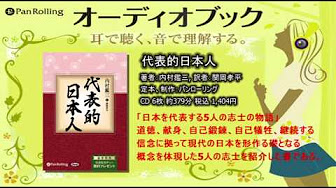
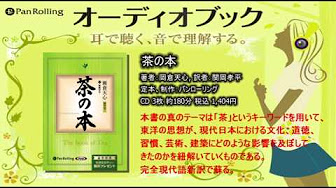
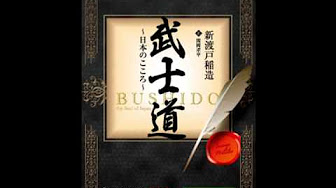
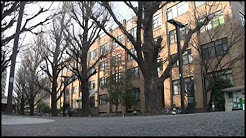
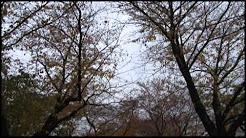
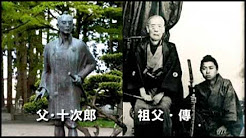

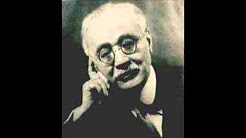



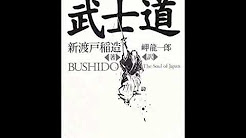
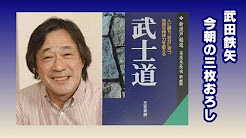
・新渡戸稲造
第1弾「世界を結ぶ『志』~新渡戸稲造の生涯~」、
第2弾「未来につながる『道』~新渡戸稲造の武士道~」、
第3弾「すべてに根ざす『愛』~新渡戸稲造の苦悩~」、
・ 新渡戸稲造の至極の名言集
・「新渡戸稲造の名言」20話
| |
・Bushido: The Soul of Japan by Inazo Nito(1-18)
・Bushido: The Soul of Japan by Inazo Nitobe(1-18)
・武士道「BUSHIDO」Japanese Ver.
・≪AI朗読≫武士道
・【武田鉄矢】『武士道』完全版
|
Bushido, the Soul of Japan
『武士道は定式化されたものではないが、昔もそして今も、日本人を鼓舞し、わが国を動かす原動力なのである』
日本人が日本人たりえる所以。
国家としての歴史的哲学体系を持たない日本の、現代社会においても尚、我々の血肉となり、在り続ける道徳律の根幹は「武士道」にあり。
日本人 新渡戸稲造博士が世界に発信した日本人論。
世代と国境を越え今なお読み継がれている世界的ベストセラー。
西洋・東洋の文化・哲学・思想と照らし合わせながら、その特異性と唯一無二の行動規範・心の拠り所を詳細に解説した普遍の書が、完全現代語訳、プロフェッショナルのナレーションで今蘇る。
21世紀。世界第三位の経済大国であるわが国日本。
政治的にも文化的にもより身近に世界と対峙する現代においてこそ、われわれの心の中に脈々と流れ続ける、日本人が日本人足らしめる「武士道」の精神を紐解く時なのではないだろうか。
本書は1世紀の時を超えた今も尚色褪せること無く、むしろその博識と見解、交える事例とそのユーモアに溢れた表現により現代人の我々にも実に痛快に日本の心「武士道」を理解させてくれる。
「武士道」がいつどのようにして始まったのか、それはどんな特徴を持ち、どのようなことを教えようとしているのか、武士以外の一般民衆にどのような影響を与えたのか、その影響がどれほど永く続いているか。
様々な角度・キーワードで武士の心得、さむらいの心の在り方をリレー形式で綴っている。
世界有数の犯罪率の低さ、大災害時での規律、自発的な他助の精神と行動は時代を超えて、親から子へと語り継がれてきた「道徳律」が存在し続けていることを如実に表している。
知っているようで知らない「日本の心」が、ここに明かされている。
内容抜粋
「今何とおっしゃいましたか?」と敬愛する教授は尋ねた。
「日本の学校には宗教の教育がないということでしょうか?」
そうですと答えると、教授は驚いて足を止めた。そして、今でも耳から離れない声音で、重ねてこう聞いた。
「宗教がない! だとしたら、いったいどうやって道徳を教えるんですか?」
この質問に私は意表を突かれ、とっさに答えを返すことができなかった。というのも、子どもの頃私が学んだ道徳というのは、学校で教わったものではなかったからである。私は、自分の持っている善悪正邪の概念を作り上げているさまざまな要素をひとつひとつ分析してみて、ようやく、それらを私の中に植えつけたのは「武士道」であったことに気づいた。
武士道とは、武士が守るよう求められる、もしくは、そう教えられる道徳的な作法である。文字に書かれたものはなく、せいぜい口伝えで伝えられた格言や、有名な武士や学者が書いたものが残されている程度である。
多くの場合そうしたものさえなく、しかしだからこそかえって深く心に刻まれ、守るべき掟<<おきて>>として強い拘束力を持っていた。ひとりの優秀な頭脳が考え出したものでもなければ、ひとりの高名な人物の生きかたが手本となってできたものでもない。数十年、数百年に及ぶ武士の歴史の中で自然に醸成されたものである。
「義は、道理に従ってためらうことなく、何をなすべきかを決断する力である。死ぬべきときは死を選び、討つべきときには討つことを選ぶ力である」
「戦いの真っただ中に飛び込んで討ち死にするのはいともたやすいことで、身分の卑しい者にもできる。生きるべきときは生き、死ぬべきときにのみ死ぬのが本当の勇気である」
「義に過ぎれば固くなる。仁に過ぎれば弱くなる」
「礼法の要点は精神を養うことにある。礼をもって静かに座っていれば、どんな乱暴者でも危害を加える気になれないほどに」
仁愛や謙譲の精神から生まれた礼儀は、他人に対する思いやりから生まれて、人への同情心を品よく優雅に表現するものだからである。
「心だに誠の道にかないなば祈らずとても神や守らん」
「忠ならんと欲すれば孝ならず、孝ならんと欲すれば忠ならず」
命は主君に仕えるための手段だと考えらえており、その理想形は、名誉のために命を捨てることであった。
「おのれの魂という畑が、優しい心で揺れ動くのを感ずるか? まかれた種が芽吹こうとしているのだ。言葉でそれを妨げてはならぬ。静かに、ひそやかに、自ら芽吹くのを見守っているのだ」
「死を軽<<かろ>>んずることは勇気のいる行為である。しかし、生きることが死よりもつらいときに、あえて生きることこそが本物の勇気である」
「かくすればかくなるものと知りながら やむにやまれぬ大和魂」
目次
訳者序文
初版への序文
改訂第10版への序文
新渡戸博士の『武士道』に寄せて
第1章 道徳体系としての「武士道」
第2章 武士道の源
第3章 「義」――あるいは正義について
第4章 「勇」――勇敢さと忍耐力
第5章 「仁」――慈愛の心
第6章 「礼」
第7章 「誠」――正直さと誠実さ
第8章 「誉<<ほまれ>>」――あるいは名誉について
第9章 「忠義」
第10章 武士の教育と鍛錬
第11章 自制心
第12章 切腹と敵討ちという制度
第13章 刀――武士の魂
第14章 女性の教育と地位
第15章 武士道から大和魂へ
第16章 武士道は今も生きているか
第17章 武士道のこれから
新渡戸稲造(Inazo Nitobe)
文久2年(1862年)、藩士 新渡戸十次郎の三男として南部藩(今の岩手県)に生まれる。
幼少期より東京英語学校に学び、少年期は、後に「代表的日本人」の著者でもある内村鑑三らとともに札幌農学校へ入学し学業を磨いた。
明治維新後はアメリカ・ドイツに渡り農政学を始め様々な研究に従事。
台湾総督府技師として台湾の殖産に携わり功績を挙げる。
国際連盟事務次長としても国際的に活躍。帰国後は様々な学校の教職を歴任した後、東京女子大学初代学長にもなる。
本書「武士道」は英語のみならずポーランド、ドイツ、ノルウェー、スペイン、ロシア、イタリアなど、主として欧米の多様な国の言語に翻訳され世界的ベストセラーとなる。旧五千円札の肖像画の人物としても有名。
TOP

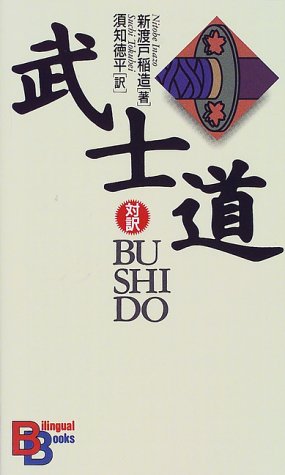

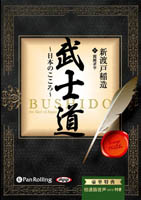 朗読,Read 朗読,Read
|
















 朗読,Read
朗読,Read
















 朗読,Read
朗読,Read